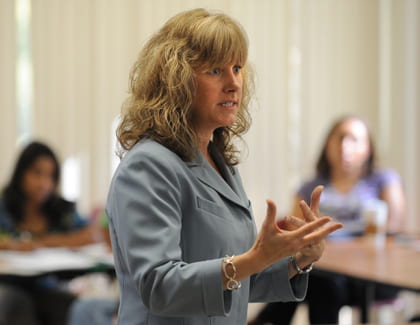Calling all nurses
UCI’s nursing science program is filling the gaps in nurses’ ranks

California’s nursing population is on the critical list and UC Irvine’s Program in Nursing Science is part of the cure.
To meet the state’s current healthcare needs, an additional 25,000 registered nurses will be needed by 2010. With its new nursing science program, UCI is doing its part to help fill this need, but the statewide commitment to nursing education is not keeping pace, says nursing science professor Susanne Phillips. As vice president of the California Board of Registered Nursing, Phillips works with policymakers, educators and healthcare administrators to boost the state’s nursing numbers. She speaks about the shortage and its implications.
Q: Why is there such a critical shortage of qualified nurses in California?
A: California currently has 130 nursing programs, and though the state is committed to increasing the number of schools and facilities, the shortage of qualified educators continues to get worse. Nursing faculty take a severe pay cut when they move from bedside to classroom, and improved funding for salaries has not been addressed in the legislature.
Q. There’s no shortage of students. What hurdles does nursing education face?
A: Nursing schools have an increasingly difficult time arranging clinical experiences for students, because more schools compete for rotations in hospitals and there is a lack of clinical nurses qualified to supervise students. Many areas of California utilize regional nursing consortiums to coordinate clinical placement for schools; however, without adequate resources at hospitals, this problem continues to grow.
Q: Nurses face more responsibilities than they did 20-30 years ago. How has the field changed? What challenge does that present to healthcare practice?
A: Technology has driven rapid change for the nursing profession. Medical technology has replaced many hands-on skills that defined nursing for centuries. Although it has advanced nursing to heights not possible 30 years ago, it also provides a significant challenge because the art and science of nursing have not changed. The foundation is not technology, but the practice of healing and caring.
Q: More than a third of today’s nursing students are men, a dramatic change from a decade ago. How is this influx of men into a woman-dominated field changing the perception and practice of nursing?
A: Perception of the nursing profession has changed dramatically. High wages, extensive benefits and retirement, flexible schedules, and the variety of professional opportunities appeal to men. Nursing is a humanistic profession, but over the last two decades, has become increasingly technical; this combination also appeals to many men.
Q: UCI’s nursing science program has great ambitions to improve the quality of nursing education in the U.S. What is the program doing differently, and better, to achieve this?
A: Our program is designed to prepare nurses for roles in research, education and advanced practice. Nurses seeking bachelor’s degrees will graduate with a greater depth of knowledge in basic science and research methods, which will prepare them to pursue master’s and doctoral degrees to become nursing faculty or assume advanced practice roles. Through extended science coursework and opportunities to collaborate on community-based research projects, UCI’s nursing graduates will positively affect faculty and clinical disparities in California and the nation.
